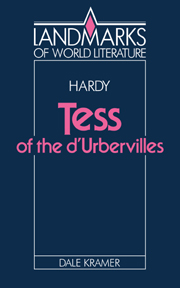Summary
Tess was published at the beginning of the last decade of the nineteenth century. It was a time of considerable intellectual and social ferment, when literary forms were being experimented with. Social conventions were being stretched by some, vigorously defended by others. It is not surprising that Tess was controversial, although novelists like Grant Allen portrayed sexual freedom more radically than Hardy. Many reviewers recognised the novel as Hardy's ‘greatest’ (William Watson, in the Academy) and his ‘most powerful’ (R. H. Hutton, in the Spectator), praising the force of Hardy's characterisations and Tess's dilemma, and believing the difference between this and his earlier stories its ‘profound moral earnestness’ (Clementina Black, in the Illustrated London News). Most of these also saw in the novel imperfections and qualities which would bring upon its author's head recriminations and blame. Other reviewers inclined more directly towards blame, expressing irritation, outrage, and disgust. Andrew Lang objected to the bitterness in the novel's concluding slur on the wicked and malignant ‘President of the Immortals’ – partly because it is insincere if Hardy does not believe in such a being; Lang also found the language used in relation to the rural classes inappropriately classical and learned. (It is Lang to whom Hardy refers ironically in the Preface to the ‘Fifth Edition’ as a reviewer ‘who turned Christian for half–an–hour the better to express his grief that a disrespectful phrase about the Immortals should have been used’ (5).)
- Type
- Chapter
- Information
- Hardy: Tess of the D'Urbervilles , pp. 99 - 104Publisher: Cambridge University PressPrint publication year: 1991

